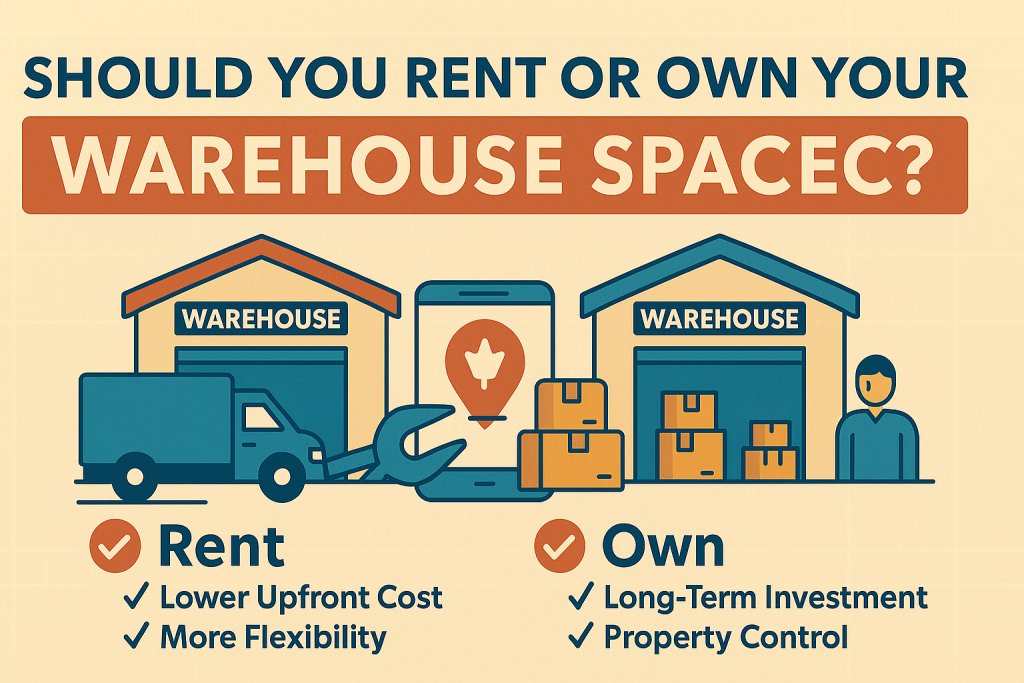By Martin Vassilev / 14 Aug, 2025

Choosing whether to rent or own warehouse space is a critical decision that impacts operational flexibility, cash flow, and long-term scalability. For businesses in logistics, e-commerce, manufacturing, and distribution, this decision goes beyond property — it’s about strategic growth, financial stability, and meeting market demands.
This comprehensive guide explores the advantages, drawbacks, and considerations of both renting and owning warehouse facilities, providing you with the insights needed to make the most informed decision for your business.
Warehouse space serves as the backbone of supply chain efficiency. The choice between renting and owning affects:
Operational flexibility in adapting to market shifts.
Capital allocation between real estate investment and business growth.
Scalability to meet demand surges or contraction.
Control over infrastructure and long-term operational stability.
Whether you’re an e-commerce brand aiming for rapid fulfillment or a manufacturing business managing bulk inventory, aligning your warehouse strategy with your operational goals is essential.
Lower Initial Capital Investment
Renting requires less upfront capital than purchasing. This frees up resources for marketing, hiring, and technology investments. Businesses often reinvest this capital into optimizing warehouse efficiency — such as using AI-driven warehouse management systems — without being tied down by heavy real estate commitments.
Flexibility to Scale Up or Down
Renting provides flexibility to expand during peak seasons or downsize during slow periods. This adaptability is crucial for industries with fluctuating demand.
Access to Prime Locations Without Ownership Costs
Renting can give you strategic access to high-demand areas, such as major transportation hubs, without the expense of purchasing premium land.
Maintenance and Repairs Often Covered
Many lease agreements include maintenance responsibilities, allowing you to focus on operations instead of facility upkeep.
No Equity Build-Up
Lease payments do not contribute to asset ownership, meaning no property value growth over time.
Potential for Rent Increases
Long-term leases can become costlier if market rates rise, cutting into profitability.
Less Customization Freedom
Significant modifications to suit your operational needs may be restricted by lease terms.
Limited Control Over Long-Term Stability
Lease non-renewals or landlord changes can disrupt business operations.
Equity and Asset Appreciation
Owning builds long-term wealth through property appreciation. This is especially valuable in logistics-heavy markets such as Ottawa, where warehouse demand is increasing (see local warehousing insights).
Operational Control
Ownership grants full customization rights — from layout optimization to technology integration, such as real-time warehouse tracking systems.
Predictable Long-Term Costs
With a fixed-rate mortgage, your long-term costs are stable, shielding you from market rent fluctuations.
Potential Rental Income
Extra warehouse space can be leased out to generate revenue, offsetting ownership expenses.

High Upfront Costs
Down payments, legal fees, and closing costs can strain cash flow, especially for growing businesses.
Reduced Flexibility
If your business outgrows the facility or changes markets, selling or leasing it can take time.
Responsibility for All Maintenance
Repairs, upgrades, and compliance with safety regulations are entirely your responsibility.
Market Risks
Property values can decline, affecting your balance sheet.
Evaluate whether your capital is better invested in operations, technology, or physical assets. Businesses focusing on rapid expansion often prefer renting, while established companies with stable demand may benefit from owning.
If your growth path is uncertain or tied to seasonal cycles, renting offers agility. However, if you have predictable demand and long-term location needs, ownership could yield greater stability.
Being near transport hubs reduces shipping costs and delivery times. Businesses operating in competitive urban markets like Ottawa should analyze location costs against operational benefits. The future of warehouse automation also influences location choice.
Automation, sustainability, and real-time data tracking are shaping modern warehousing. Ownership allows full integration of these systems without landlord restrictions, but renting can enable quicker adoption of new facility technologies as they become available.
Some companies adopt a hybrid approach: owning a central warehouse while renting satellite facilities for peak seasons. This model provides stability while offering the scalability needed for fluctuating market demands.
For example, a retail brand might own a main distribution center equipped with lean warehousing processes while renting smaller, temporary fulfillment hubs in high-demand regions during the holiday season.
Renting: Lease payments are typically fully deductible as business expenses, reducing taxable income.
Owning: Property taxes, mortgage interest, and depreciation may offer significant tax benefits.
Regulatory Compliance: Both options require adherence to zoning, safety, and environmental laws. For guidance, review resources from Canada Revenue Agency and your local municipality.
Startups or growing businesses needing capital flexibility.
Companies in rapidly changing markets.
Businesses expecting major shifts in distribution channels or customer locations.
Established companies with stable long-term demand.
Businesses seeking to control all aspects of their warehousing operations.
Organizations aiming to build equity while reducing long-term occupancy costs.
The decision to rent or own warehouse space should align with your financial goals, operational needs, and market trajectory. Consider hybrid models if you want the stability of ownership and the flexibility of renting. As market conditions evolve and warehouse technologies advance, revisit your strategy regularly to ensure it continues to support your business growth.
For businesses seeking to maximize warehouse efficiency and cut costs, partnering with a logistics provider that understands your operational goals is key. Contact ByExpress to explore customized warehousing solutions that align with your growth plans.

“Thanks to Byexpress all my shipping and fulfillment costs are in line now”

“All my issues were solved by Byexpress team that I had with pervious 3pl provider.”

“Thank you Byexpress team could not done it without you guys.”

“Their integration and customer service were the key for me”

“Outstanding delivery service! The package was well-packaged, and
the delivery team was professional and courteous”

“Great and knowledgeable team to work with.”

Thanks, guys, for reducing my shipping rates
Ottawa Office
2411 Holly Lane
Ottawa, ON, K1V 7P2
Toronto Office
13-280 West Beaver Creek Road Unit #136
Richmond Hill, ON, L4B 3Z1
Alexandria Office
173 Kenyon Street West
Alexandria, ON, K0C 1A0
Montreal Office
4388 Saint-Denis Street Unit #200
Montreal, QC, H2J 2L1
California Office
155 North Riverview Drive
Anaheim Hills, CA, 92808
Call Us
Toll-Free: 1-866-744-7122
Local : 613-739-3000
Email Us
Multilingual Services










